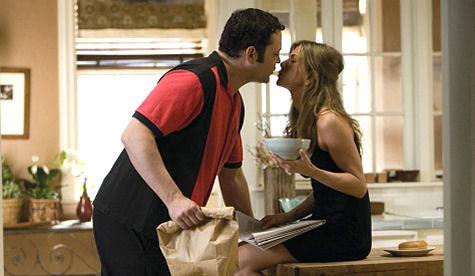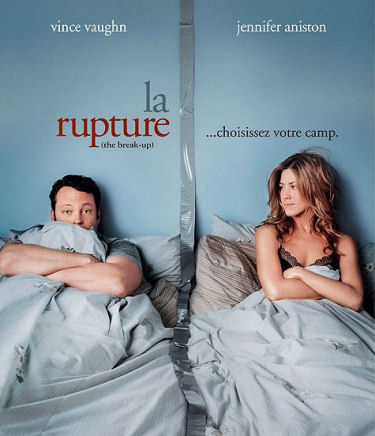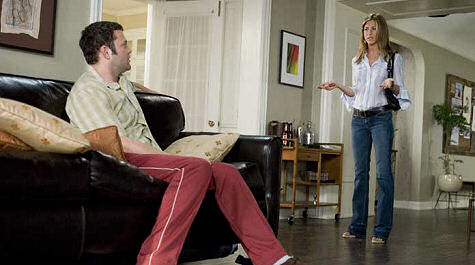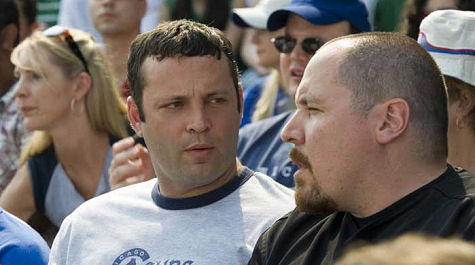Not Half Bad
The Break-up, which I saw yesterday in Paris under the title of La Rupture, is a much better film than I heard and read it would be, and one of my thoughts as I left the UIP screening room is that Universal has lied its ass off by selling this film the way they have.
Deceptive ads and trailers are respected, of course, because they tend to sell tickets. Last Thursday’s figures projected that The Break-Up would earn about $25 million or so domestically, a drop from an earlier projected figure of $30 million. But that turned out to be wrong — the film will earn a rocking $37 million by Sunday night.

Vince Vaughn, Jennifer Aniston in
The Break-Up The Break-Up isn’t a great film or one you could even say to a friend with an enthusiastic straight face, “It’s exceptionally good and nourishing…definitely go see it!” But it’s not that bad and is by and large a decent effort. It has some problems here and there, but relatively minor ones — I was never doubled over in pain.
The story could have used some more depth (i.e., not just at the end) and could have used stronger secondary characters and a bit more plot texturing. It would have been way better, actually, if someone had said, “Let’s really toss out the idea of satisfying the emtional-formula date crowd and try to make an Ingmar Bergman movie…let’s make Scenes from a Break-Up!”
< ?php include ('/home/hollyw9/public_html/wired'); ?>
But even as is, The Break-Up deserves a measure of credit for being a somewhat ballsy drama by having gone “real”, especially given the date-movie demographic and the escapist expectations that star-cowriter Vince Vaughn, director Peyton Reed and screenwriters Jeremy Garelick and Jay Lavender obviously knew were out there.
It’s about a break-up, all right…just not a breakup and then a reconciliation. Not a whole lot transpires except for some typical Mars-and-Venus mis-readings between a Chicago couple (Vaugh, Jennifer Aniston). This leads to a relationship meltdown that gets worse and worse, and finally peters out just as their defenses come down. Too bad.

But the film gets thoughtful and grounded towards the end, and the ending is half-decent. And not the ending they reportedly re-shot, with Vaughn and Anistonrunning into each other months later with new opposite-sex partners who look almost exactly like they do. It’s something else.
Vaughn delivers some zingers here and there (especially in the beginning) and a playful tone kicks in every so often, but despite Vaughn’s Wedding Crashers rep and the ads and trailers indicating that The Break-Up some kind of comedy, no one but those full-of-shit Pinocchio-nose Universal marketers is ever going to call it one.
Accept this and you’ll be okay: there are no laughs after the first third of The Break-up, and there’s no bouncy comic energy or pacing in any of it. Not by the standards I know and suscribe to, at least. (I definitely regard Some Like It Hot as a comedy, but The Apartment as a relationship drama with schtick…okay?)
The Break-Up isn’t funny because it’s not intended to be. It’s a decently made, reasonably mature, well-acted relationship drama with humorous punctuation from time to time (i.e., mostly in the early portions). Vaughn and Jennifer Aniston do well by their roles, given the material. Take no notice to any critic who says they bomb out in this thing because they absolutely don’t. They’re just not going for the Big Laughs.

Vaughn does his mouthy-guy schtick for somewhere between two-thirds and three-quarters of the film, but then the movie turns solemn and introspective in the final quarter, and Vaughn follows suit in what I felt was a dug-in, rooted way.
The only thing bothersome is that Vaughn is really packed it on prior to shooting this film. (Incessant partying over the huge success of Wedding Crashers?) He’s just physically not the same guy he was last summer, and I don’t mean to sound weird about this but I was disturbed by the inevitable metaphor that sits astride any character with a bull neck and a bloated puffy face. (He is somewhat slimmed down in the final scene, which Aniston remarks upon.)
I was also seriously taken with Aniston’s performance. I was moved, convinced, persuaded — I believed her all the way. For me her work in this film signifies the end of her losing streak, whether The Break-Up makes big moolah or not.
My supporting cast favorites are the always on-target Jon Favreau as Vaughn’s easy-rolling but perceptive best-buddy, who brings the film into a bottom-touching mode in the third act, and Vincent D’Onofrio as his older worry-wart brother (Favreau, curiously, is also hugely bulked up in this thing.)

I won’t run a humiliating, side-by-side
comparison photo showing how these guys looked when they made
Swingers eleven years ago, but….
Joey Lauren Adams and Judy Davis have vivid if under-developed roles as, respectively, Aniston’s good friend and a neurotic threatening employer.
This is a non-mainstream mainstream movie that’s taking a Big Risk. It’s obviously much more of a fall movie than a summer movie, just as it’s clearly a dramatic Anti-Date movie being sold as a comedic Date Movie in a cynical attempt to attract Wedding Crashers fans.
Hats off to Vaughn, Aniston, Reed, Garelick and Lavender…not for making a wonderfully fantabulous film, but for at least taking a stab at something relatively honest and real-life-ish, and for not copping out to the usual romantic-comedy formula crap.
And…well, I’m not exactly saying thumbs-down to Universal marketers for peddling a Big Effin’ Lie so the studio could earn a massive $37 million pot this weekend. Good for them, I guess, even if it stinks.
But defiitely a big task-tsk also to Universal publicity team for not reaching out early to critics who might have understood what the film was really about and might appreciate the integrity that went into it, which could have generated some thoughtful buzz early on.








